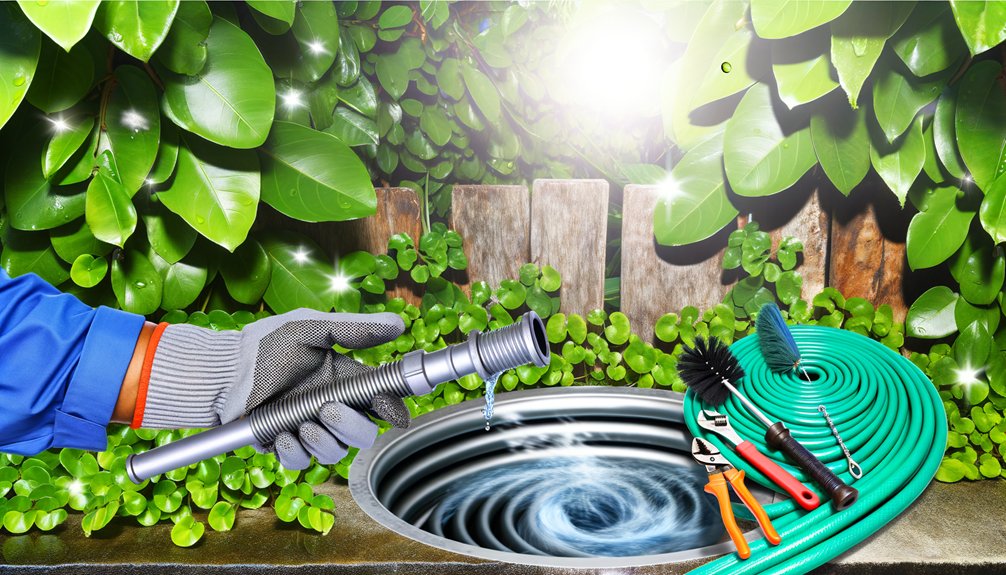Top tips for drain maintenance include regular monthly cleaning with a mixture of baking soda and vinegar to prevent clogs. Homeowners should utilize essential tools like an auger and plunger for clearing blockages. Flushing drains weekly with hot water helps remove grease and food particles. Installing strainers can catch debris and minimize plumbing issues. Consistent attention to drain health promotes a hygienic environment, reducing the risk of mold and unpleasant odors. Further insights on effective management techniques are available.
Importance of Regular Drain Maintenance

While many homeowners may overlook the significance of regular drain maintenance, it plays an essential role in preserving the integrity of plumbing systems. Neglecting this critical aspect can result in clogged drains, which may lead to costly repairs and significant disruptions. Regular maintenance helps to prevent future clogs by effectively managing food waste and minimizing grease buildup. Monthly cleaning routines utilizing baking soda and vinegar can break down debris, while flushing the drains with hot water removes organic material, ensuring ideal drainage. Additionally, maintaining unclogged drains reduces health hazards such as mold and mildew growth, which can exacerbate respiratory conditions. By prioritizing preventative drain measures, homeowners can save substantial amounts of money by avoiding emergency plumbing services and extensive repairs associated with neglected drain issues. Consequently, consistent drain maintenance not only enhances the longevity of pipes but also fosters a healthier living environment. Installing a sump pump can further help manage excess water and prevent flooding issues.
Effective DIY Cleaning Solutions
To maintain ideal drain function, homeowners can employ several effective DIY cleaning solutions that utilize common household items. Regular cleaning not only prevents clogs but also enhances drainage efficiency.
Homeowners can easily enhance drainage efficiency and prevent clogs with simple DIY cleaning solutions using common household items.
- Combine 1 tablespoon of table salt with ¼ cup of white vinegar for bathroom drains; let it sit for an hour before flushing with hot water.
- For kitchen sinks, to tackle grease clogs, mix a tablespoon of liquid dish detergent with boiling water, pouring the hot solution gradually to melt deposits.
- Monthly maintenance can be achieved by using half a cup of baking soda followed by a cup of vinegar, allowing the mixture to sit overnight before flushing with hot water.
Additionally, pouring ½ cup of vinegar down drains once a week helps keep them clear. Avoid relying on chemical drain cleaners; these DIY methods are effective, environmentally friendly, and promote drain longevity.
Tools and Techniques for Clog Prevention

Effective clog prevention requires both the right tools and techniques to safeguard plumbing systems from potential blockages. Essential tools, such as an auger, snake, and cup plunger, should be readily available to address clogs promptly. Regularly utilizing a mixture of baking soda and vinegar can maintain clean drains and prevent buildup; a monthly treatment is advisable for ideal results. Additionally, flushing drains weekly with hot water effectively removes grease and food scraps, ensuring smoother flow and enhanced odor. Employing a small sieve or strainer is vital for catching food residue, preventing it from entering the plumbing system. Moreover, educating household members about proper disposal methods can greatly minimize the risk of blockages. By implementing these techniques, homeowners can effectively maintain their drains and enhance overall plumbing functionality, ultimately ensuring a free-flowing and hygienic environment.
Frequently Asked Questions
How to Maintain a Drainage System?
To maintain a drainage system effectively, one must prioritize regular inspections and pipe maintenance to identify issues early. Employing professional services for thorough drain cleaning can prevent grease buildup and root intrusion. Seasonal checks are essential for ensuring unobstructed water flow and effective debris removal. Implementing reliable drainage solutions enhances system longevity, while consistent monitoring helps mitigate potential problems, ultimately fostering a more efficient and resilient drainage infrastructure.
What Is the Best Thing to Keep Drains Clear?
To keep drains clear, adopting a "stitch in time saves nine" approach proves essential. Regular inspections and preventative measures, such as the use of drain covers and hair traps, greatly reduce clog potential. Implementing home remedies like baking soda and vinegar can combat grease buildup effectively. In addition, establish a maintenance schedule that includes drain cleaning and drain additives for best performance. These strategies collectively form a robust defense against future drainage issues.
Do Baking Soda and Vinegar Work Better Than Drano?
The comparison between baking soda and vinegar versus Drano reveals significant advantages. Baking soda benefits from its ability to engage in chemical reactions with vinegar properties, effectively cleaning drains through natural alternatives. This eco-friendly solution guarantees plumbing safety, reducing the risk of corrosion. Regarding cost comparison and long-term effects, regular use of baking soda and vinegar for drain cleaning serves as a proactive maintenance tip, ultimately promoting sustainable plumbing practices.
Why Do Plumbers Say to Not Use Drano?
Plumbers advise against using Drano due to its potential for significant pipe damage and environmental impact. The caustic nature of this chemical drain cleaner can exacerbate clogs, leading to costly repairs. Many plumbing myths suggest such products are effective; however, safer alternatives like baking soda and vinegar offer natural solutions for drain cleaning. These options not only prevent clogs but also promote cost effectiveness and maintain plumbing integrity without harmful side effects.


